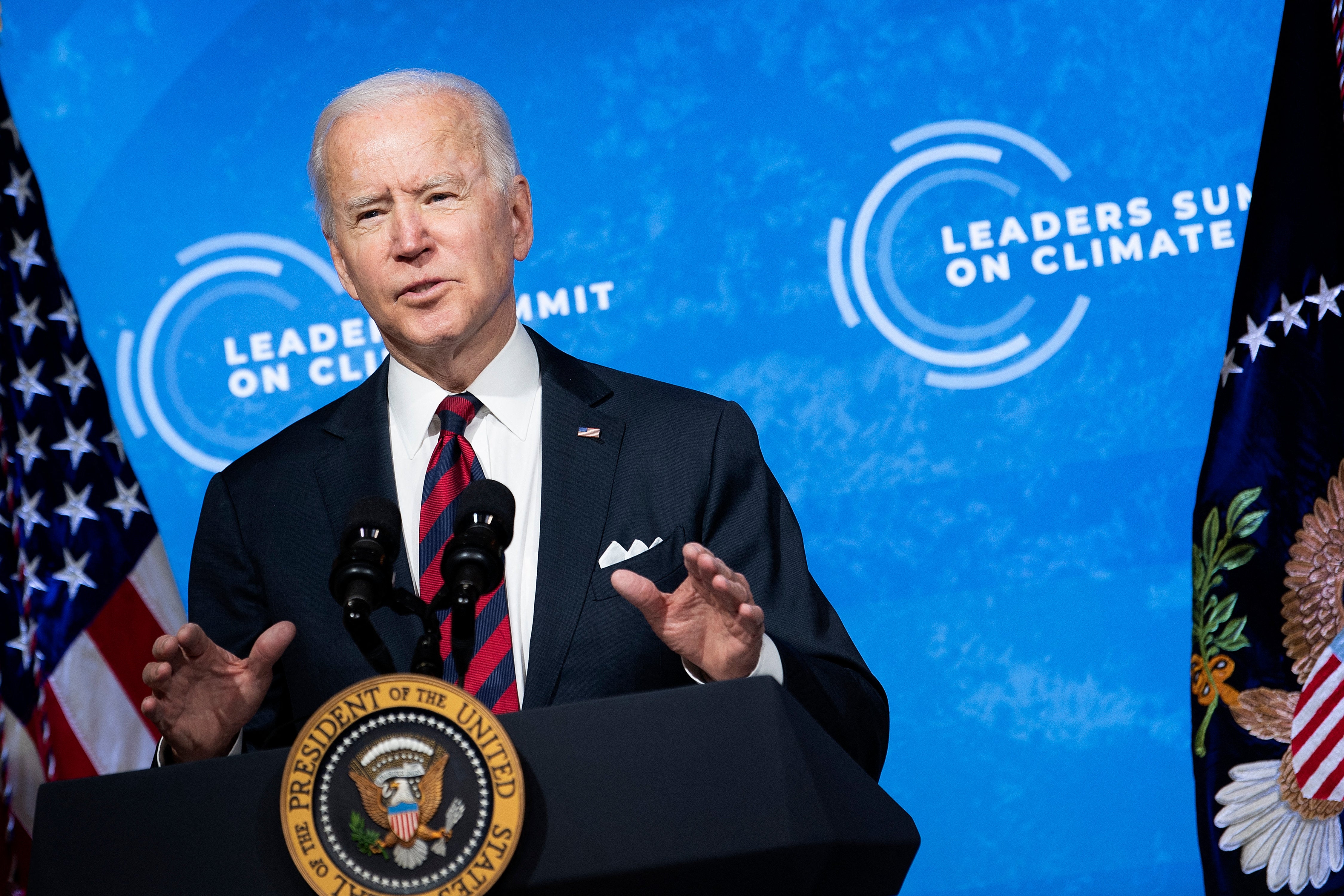These are the 10 vital questions nobody asked at the Earth Day summit
Joe Biden and the West’s ambitious carbon emissions targets are fine, in theory – but what really counts in tackling the climate crisis is action

It was an Earth Day like no other. The recent US presidential election means that President Biden – not President Trump – is dictating American policy on the climate emergency. And Biden has hit the ground running.
By organising the first ever Climate Summit on Earth Day, he injected momentum and focus into the UN climate change negotiations that had been floundering under Boris Johnson’s Murdochian double-speak.
His summit pressed leaders to increase their commitments to cut carbon emissions, not just for some far-off date in the 2050s, but, crucially, for the imminent future in the 2020s.
Biden rightly outlined how critical deep cuts in this decade are, if humanity has any chance of diminishing the increasingly disastrous impacts of the carbon emissions we have already released – and continue to release – globally.
Biden himself doubled the US’s previous Obama commitment to a 25 per cent cut in emissions by 2030, to 52 per cent.
Canada increased theirs to 40 per cent, and Japan to 46 per cent. The UK had in the run up to the summit, announced a 78 per cent cut by 2050.
But, forgive me for adding a hefty dose of cynicism. I am old enough to have seen many such “make or break” summits and announcements come and go to tackle the climate crisis, and have seen such efforts fail repeatedly even to slow down the increases in levels of carbon emissions in the atmosphere.
The upper limit for safe levels of CO2 is 350 parts per million (ppm). They were at 328 ppm in 1970 when the first Earth Day was held. They are now at 417 ppm – and the IEA just announced that 2021 is on course to have the second highest increase in carbon emissions in history, as the economy bounces back after the Covid-19 pandemic.
So, these targets are fine, in theory – but what really counts is action.
I would like to put these questions to our world leaders: Will governments abolish fossil fuel subsidies and tax breaks? Will we halt deforestation? Will we impose an immediate moratorium on banks and oil corporations funding all new fossil fuel projects? Will we ban immediately the sale of new fossil fuel vehicles? Will we ban new fossil fuelled heating systems? Will we outlaw the building of new coal and gas power stations? Will we stop the rich flying endlessly around the world? Will we ration meat? Will we adequately fund the global south to move directly to renewable energy economies? Will we guarantee all women to have the human right to education, family planning and economic independence to tackle the destructive population explosion?
I ask these vital questions, because none of them were on the agenda at the Earth Day summit.
Indeed, most of the talk was about how new technologies would save us, and allow us to continue our destructive consumerism and population explosion unimpeded. And, most worryingly, China and India did not commit to any new deeper cuts.
As ever, Boris Johnson embarrassed the UK with a bumbling hypocritical speech attacking climate protectors by dehumanising us, saying that it’s, “vital for all of us to show that this is not all about some expensive politically correct green act of ‘bunny hugging’”.
The reality, of course, is that Johnson is the one promising to pull the climate zero-carbon bunny out of his imaginary technological hat. His recent supposed 10-point plan included – among many imaginary rabbits – nuclear fusion; a technology that has failed to produce a single watt of net electricity in the 70 years of wasteful investment in its research. But Johnson is pitting our 2050 net-zero carbon target on building such power-plants by the 2040s.
In the meantime, the government is slashing aid to the poorest women in the world; cutting taxes for fossil fuels and aviation; building new airports and roads; opening new oil and gas fields and possibly coal mines in the UK; whilst UK banks like Barclays and HSBC pour hundreds of billions of dollars into new fossil fuel projects around the world.
But in the midst of my cynicism there was something new in Joe Biden’s speech. It was the first time I heard a politician refer honestly to the consequences of real action on the crisis when he said: “I see workers capping hundreds of thousands of abandoned oil and gas wells that need to be cleaned up, and abandoned coal mines that need to be reclaimed, putting a stop to the methane leaks and protecting the health of our communities.”
Biden thus touched upon a truth that Johnson almost never has. A just energy transition will not only create millions of new jobs in nature repair, renewable energy, cycling infrastructure and home insulation, but will also mean the elimination of millions of current jobs.
Oil engineers, diesel-engine factory workers, gas-cooker repair people and a whole host of other workers will need funding to retrain and acquire new skills and jobs.
But we have done this before. Within months of the US entering World War II, the country’s industrial base switched almost overnight from peacetime production to a wartime economy.
This is exactly the level of speed needed now to switch from a fossil fuelled economy to a renewable energy fuelled one.
By daring to name the consequences of real action, maybe Joe Biden has bravely pushed open the political door a tiny chink further to allow the possibility of some of the deeply transformative actions required at last.
Subscribe to Independent Premium to bookmark this article
Want to bookmark your favourite articles and stories to read or reference later? Start your Independent Premium subscription today.

Join our commenting forum
Join thought-provoking conversations, follow other Independent readers and see their replies